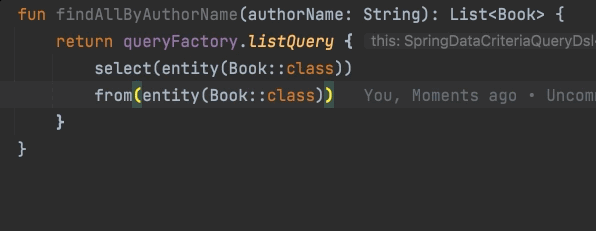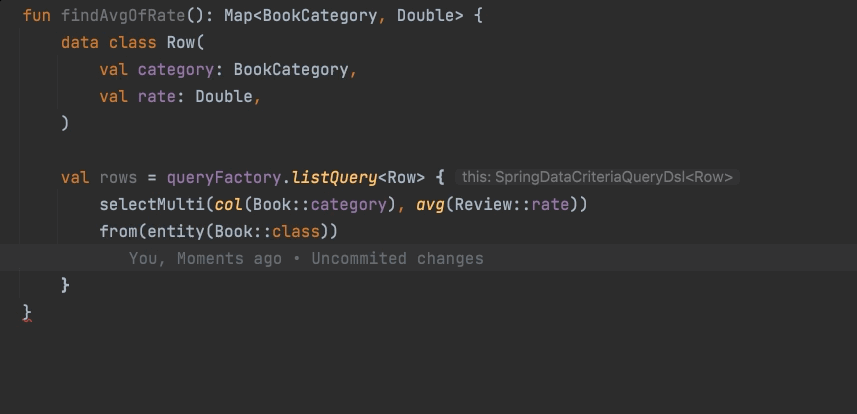


Kotlin JDSL is DSL for JPA Criteria API without generated metamodel and reflection. It helps you write a JPA query like writing an SQL statement.
There are several libraries in the easy way to use JPA. However, those libraries have to use APT. If you use APT, there is a problem that you have to compile again when the name or type of entity field is changed. So, in order not to use APT, we created this library using the KProperty created by the kotlin compiler.
If you want to know more about the background of Kotlin JDSL, I recommend reading the blog
If you are interested in JPA Reactive See more
Add Hibernate Kotlin JDSL and Hibernate to dependencies
dependencies {
implementation("com.linecorp.kotlin-jdsl:hibernate-kotlin-jdsl:x.y.z")
implementation("org.hibernate:hibernate-core:x.y.z")
}Add Eclipselink Kotlin JDSL and Eclipselink to dependencies
dependencies {
implementation("com.linecorp.kotlin-jdsl:eclipselink-kotlin-jdsl:x.y.z")
implementation("org.eclipse.persistence:org.eclipse.persistence.jpa:x.y.z")
}Create QueryFactory using EntityManager
val queryFactory: QueryFactory = QueryFactoryImpl(
criteriaQueryCreator = CriteriaQueryCreatorImpl(entityManager),
subqueryCreator = SubqueryCreatorImpl()
)Query using it
queryFactory.listQuery<Entity> {
select(entity(Book::class))
from(entity(Book::class))
where(column(Book::id).equal(1000))
}If you use Spring Boot & Data Frameworks See more
You can easily write query using Entity associations.
If you want to return the DTO, use the DTO as the return type.
QueryFactory allows you to create JPA queries using DSL just like SQL queries.
val books: List<Book> = queryFactory.listQuery {
select(entity(Book::class))
from(entity(Book::class))
where(column(Book::author).equal("Shakespeare"))
}Kotlin JDSL converts null in where condition to EmptyPredicateSpec object.
note that EmptyPredicateSpec turns into 1=1 sql
val books: List<Book> = queryFactory.listQuery {
select(entity(Book::class))
from(entity(Book::class))
where(
name?.run { column(Book::author).equal(this) }
)
}You can chain conditions using the whereAnd or whereOr method.
whereAndconnects each condition withand,whereOrconnects withor.- Each method is connected by
and.
val books: List<Book> = queryFactory.listQuery {
select(entity(Book::class))
from(entity(Book::class))
whereOr(
column(Book::author).equal("Dan Brown"),
column(Book::author).equal("Hemingway")
)
whereAnd(
column(Book::viewCount).greaterThan(10000L),
column(Book::isBorrowed).isFalse()
)
}If you want to select the DTO, select columns in the order of constructor parameters.
data class Row(
val author: String,
val count: Long,
)
val books: List<Row> = queryFactory.listQuery {
select(listOf(column(Book::author), count(column(Book::id))))
from(entity(Book::class))
groupBy(column(Book::author))
}data class Row(
val author: String,
val count: Long,
)
val books: List<Row> = queryFactory.listQuery {
selectMulti(column(Book::author), count(column(Book::id)))
from(entity(Book::class))
groupBy(column(Book::author))
}Users can perform bulk update/delete through update/delete query.
- kotlin-jdsl's update/delete does not require from clause. Type T given as generic handles from automatically.
- According to the JPA specification, update/delete does not support join, fetch, group by, order by, limit.
- If you want to use an association mapping as a where condition, you must use associate.
val query: Query = queryFactory.updateQuery<Order> {
where(col(Order::purchaserId).`in`(1000, 2000))
setParams(col(Order::purchaserId) to 3000)
}
val updatedRowsCount: Int = query.executeUpdate()
val deleteQuery: Query = queryFactory.deleteQuery<Order> {
where(col(Order::purchaserId).`in`(1000, 2000))
}
val deletedRowsCount: Int = deleteQuery.executeUpdate()Kotlin JDSL supports various expressions.
val max = max(column(Book::price))
val count = count(column(Book::price))
val greatest = greatest(column(Book::createdAt))val case = case(
`when`(column(Book::name).like("A%")).then(literal(1)),
`when`(column(Book::name).like("B%")).then(literal(2)),
// ...
`else` = literal(999)
)val authorIds = queryFactory.subquery<Long> {
select(column(Book::authorId))
from(entity(Book::class))
// ...
}
val authors: List<Author> = queryFactory.listQuery {
// ...
where(column(Author::id).`in`(authorIds))
}You can use the nestedCol function to get the foreign Key value.
val orderIdsInOrderGroupTable = queryFactory.listQuery {
select(nestedCol(col(OrderGroup::order), Order::id))
from(entity(OrderGroup::class))
}You can get the value of foreign Key using nested, an extension function in ColumnSpec.
val orderIdsInOrderGroupTable = queryFactory.listQuery<Long> {
select(col(OrderGroup::order).nested(Order::id))
from(entity(OrderGroup::class))
}Kotlin JDSL supports various predicates.
val condition = and(
column(Book::author).equal("Shakespeare"),
column(Book::price).lessThanOrEqualTo(100.toBigDecimal()),
column(Book::status).`in`(SALE, OUT_OF_STOCK),
column(Book::createdAt).between(Time.of("2001-01-01"), Time.of("2010-12-31")),
)val books = queryFactory.listQuery<Book> {
select(entity(Book::class))
from(entity(Book::class))
join(Book::author) //Default is `JoinType.INNER`
join(Book::publisher, JoinType.LEFT)
join(Book::seller, JoinType.RIGHT)
// ...
}val books = queryFactory.listQuery<Book> {
select(entity(Book::class))
from(entity(Book::class))
fetch(Book::author)
// ...
}If join and fetch are used together for the same entity, only fetch is applied.
val books = queryFactory.listQuery<Book> {
select(entity(Book::class))
from(entity(Book::class))
join(Book::author) // Join is ignored
fetch(Book::author) // Only fetch is applied
// ...
}val books = queryFactory.listQuery<Book> {
select(entity(Book::class))
from(entity(Book::class))
join(entity(Author::class), on(column(Book::authorId).equal(column(Author::id))))
// ...
}There may be models with the two associations of same type. In this case, separate the Entity using alias.
val orders = queryFactory.listQuery<Order> {
select(entity(Order::class))
from(entity(Order::class))
join(entity(Order::class), entity(Address::class, alias = "shippingAddress", on(Order::shippingAddress)))
join(entity(Order::class), entity(Address::class, alias = "receiverAddress", on(Order::receiverAddress)))
// ...
}associate behaves similarly to join, and operates exactly the same as join in select, and since Join cannot be used in update/delete, use associate to associate the relationship with other internally mapped objects (ex: @Embedded) You can build it and run the query.
val query = queryFactory.selectQuery<String> {
select(col(Address::zipCode))
from(entity(OrderAddress::class))
associate(OrderAddress::class, Address::class, on(OrderAddress::address))
}
val updatedRowCount = queryFactory.updateQuery<OrderAddress> {
where(col(OrderAddress::id).equal(address1.id))
associate(OrderAddress::class, Address::class, on(OrderAddress::address))
set(col(Address::zipCode), "test")
set(col(Address::baseAddress), "base")
}.executeUpdate()
val deletedRowCount = queryFactory.deleteQuery<OrderAddress> {
where(col(OrderAddress::id).equal(address1.id))
associate(OrderAddress::class, Address::class, on(OrderAddress::address))
}.executeUpdate()There may be situations where you need to downcast when using an Entity of an inheritance structure. In that case, you can use the code like below.
val employees = queryFactory.listQuery<Employee> {
selectDistinct(entity(Employee::class))
from(entity(Employee::class))
treat<Employee, PartTimeEmployee>()
where(
col(PartTimeEmployee::weeklySalary).lessThan(1000.toBigDecimal()),
)
}If you are downcasting from the root entity (Project Entity in this case) that contains an entity with inheritance structure, you can do it as follows.
val projects = queryFactory.listQuery<Project> {
selectDistinct(entity(Project::class))
from(entity(Project::class))
treat<Employee, FullTimeEmployee>(col(Project::employees))
where(
col(FullTimeEmployee::annualSalary).greaterThan(100000.toBigDecimal())
)
}For Hibernate, the issue at issue is currently unresolved and an additional inner(left) join is added to make the result It may come out as a duplicate. So you should always apply distinct to select above like examples
If you are using Hibernate and want to fetch downcasting entities, the query cannot be executed normally. That is, the example below will result in a runtime error because of this issue.
val sub = queryFactory.subquery<Long> {
select(col(Project::id))
from(entity(Project::class))
treat<Employee, FullTimeEmployee>(col(Project::employees))
treat<Employee, PartTimeEmployee>(col(Project::employees))
where(
or(
col(FullTimeEmployee::annualSalary).greaterThan(100000.toBigDecimal()),
col(PartTimeEmployee::weeklySalary).greaterThan(1000.toBigDecimal()),
)
)
}
val projects = queryFactory.listQuery<Project> {
val project = Project::class.alias("dedupeProject")
selectDistinct(project)
from(project)
val supervisor = Employee::class.alias("super")
val partTimeSuper = PartTimeEmployee::class.alias("partSuper")
// If you are using Hibernate and want to fetch downcasting entities, the query cannot be executed normally. That is, the example below will result in a runtime error.
fetch(project, supervisor, on(Project::supervisor))
treat(ColumnSpec<PartTimeEmployee>(project, Project::supervisor.name), supervisor, partTimeSuper)
where(
and(
col(project, Project::id).`in`(sub),
col(partTimeSuper, PartTimeEmployee::weeklySalary).equal(900.toBigDecimal()),
)
)
}If you want to use downcasting entity in select clause, Eclipselink does not support that function. An example is as follows.
val employees = queryFactory.listQuery<FullTimeEmployee> {
val project: EntitySpec<Project> = Project::class.alias("project")
val fullTimeEmployee = FullTimeEmployee::class.alias("fe")
val employee = Employee::class.alias("e")
selectDistinct(fullTimeEmployee)
from(project)
treat(ColumnSpec<FullTimeEmployee>(project, Project::employees.name), employee, fullTimeEmployee)
where(
ColumnSpec<BigDecimal>(fullTimeEmployee, FullTimeEmployee::annualSalary.name)
.greaterThan(100000.toBigDecimal())
)
}
The Entity structure corresponds to the following structure.
@Inheritance(strategy = InheritanceType.SINGLE_TABLE)
@Entity
@Table(name = "employee")
@DiscriminatorColumn(name = "EMP_TYPE")
class Employee(
@Id
@GeneratedValue
val id: Long,
val name: String
) {
override fun equals(other: Any?) = Objects.equals(id, (other as? Employee)?.id)
override fun hashCode() = Objects.hashCode(id)
}
@Entity
@Table(name = "fulltime_employee")
@DiscriminatorValue("F")
class FullTimeEmployee(
val annualSalary: BigDecimal,
override val id: Long,
override val name: String
) : Employee(id, name) {
override fun equals(other: Any?) = Objects.equals(id, (other as? FullTimeEmployee)?.id)
override fun hashCode() = Objects.hashCode(id)
}
@Entity
@Table(name = "parttime_employee")
@DiscriminatorValue("P")
class PartTimeEmployee(
val weeklySalary: BigDecimal,
override val id: Long,
override val name: String
) : Employee(id, name) {
override fun equals(other: Any?) = Objects.equals(id, (other as? PartTimeEmployee)?.id)
override fun hashCode() = Objects.hashCode(id)
}
@Entity
@Table(name = "contract_employee")
@DiscriminatorValue("C")
class ContractEmployee(
val hourlyRate: BigDecimal,
override val id: Long,
override val name: String
) : Employee(id, name) {
override fun equals(other: Any?) = Objects.equals(id, (other as? ContractEmployee)?.id)
override fun hashCode() = Objects.hashCode(id)
}
@Entity
@Table(name = "project")
class Project(
@Id
@GeneratedValue
val id: Long = 0,
val name: String,
@OneToMany(cascade = [CascadeType.ALL])
val employees: List<Employee>,
@OneToOne(cascade = [CascadeType.ALL], optional = false, fetch = FetchType.LAZY)
val supervisor: Employee
) {
override fun equals(other: Any?) = Objects.equals(id, (other as? Project)?.id)
override fun hashCode() = Objects.hashCode(id)
}
Kotlin's property reference provides KProperty interface. KProperty is created in java file at kotlin compile time. Since KProperty has the name of property, we can use it to write the expression of the Critical API.
If you type the JPA query as below,
queryFactory.listQuery<Book> {
select(entity(Book::class))
from(entity(Book::class))
where(column(Book::name).equal("Hamlet").and(column(Book::author).equal("Shakespeare")))
}Kotlin compiler creates PropertyReference.
final class ClassKt$books$1 extends PropertyReference1Impl {
public static final KProperty1 INSTANCE = new ClassKt$books$1();
books$1() {
super(Book.class, "name", "getName()Ljava/lang/String;", 0);
}
@Nullable
public Object get(@Nullable Object receiver) {
return ((Book) receiver).getName();
}
}
final class ClassKt$books$2 extends PropertyReference1Impl {
public static final KProperty1 INSTANCE = new ClassKt$books$2();
ClassKt$books$2() {
super(Book.class, "author", "getAuthor()Ljava/lang/String;", 0);
}
@Nullable
public Object get(@Nullable Object receiver) {
return ((Book) receiver).getAuthor();
}
}If you have any questions, please make Issues. And PR is always welcome.
Are you ready to join us? - https://careers.linecorp.com/ko/jobs/862
See CONTRIBUTING. If you believe you have discovered a vulnerability or have an issue related to security, please contact the maintainer directly or send us an email before sending a pull request.
Copyright 2021 LINE Corporation
Licensed under the Apache License, Version 2.0 (the "License");
you may not use this file except in compliance with the License.
You may obtain a copy of the License at
http://www.apache.org/licenses/LICENSE-2.0
Unless required by applicable law or agreed to in writing, software
distributed under the License is distributed on an "AS IS" BASIS,
WITHOUT WARRANTIES OR CONDITIONS OF ANY KIND, either express or implied.
See the License for the specific language governing permissions and
limitations under the License.
See LICENSE for more details.
See the complete list of our contributors.

